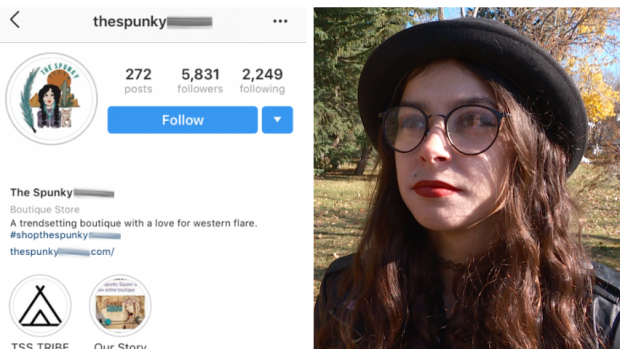Facebook temporarily bans woman who called out store name with anti-Indigenous slur
For the latest on this story and Facebook's response, click here.
An Alberta woman found herself temporarily banned from Facebook this weekend after she called out a business owner whose company name includes a racial and gendered slur against Indigenous women.
Rhiannon Babyn said when she first saw the page for "The Spunky Sq--w" online clothing store on Instagram and Facebook, she was incensed.
'It's like using the n-word'
"This is completely awful," she said. "It's like using the n-word."
Babyn messaged the store, writing that it was "not OK" for the business to use that name, especially as the owner seemingly has no Indigenous background, and asked the company to do some research on the term.
After Brooke Adams, the Texas college student who owns the store, responded, Babyn doubled down — calling her a "white b---h," and earning herself a temporary ban from the social networking site.
"Yes, it was not a correct way to respond to things," Babyn said, but added that it feels like a double standard she was blocked for saying "white b---h" but Adams wasn't for saying "sq--w."

Adams did not respond to CBC Calgary's request for comment in time for publication.
"There is absolutely no derogatory meaning in the word 'sq--w' … When I started my business I really did think I had chosen an empowering and fun name," Adams wrote on her Facebook page. "Until this week, I have never had a negative representation with a Native American/Indian/Indigenous Native American. I will not accept this a good [sic] representation of that culture."
Babyn wasn't the only one criticizing the store, which received a flood of negative comments. Its Facebook and Instagram pages have since been taken down.
Thousands of people have also signed an online petition requesting the business change its name.
A brand representative for "The Spunky Sq--w" store, Makayla Baker, responded to Indigenous women calling out the brand by calling them #YouDamnSq--w. Her account, unlike Babyn's, does not appear to have been suspended and neither was Adams'.
'Its use is not appropriate'
The Canadian Oxford Dictionary labels the term "offensive" slang for an Indigenous woman, and activists say it's not appropriate to use.
"The term is an ethnic and racial slur. Contemporary use of the term is considered offensive, derogatory, misogynist and racist. Its use is not appropriate in any way," said Rachelle Venne, CEO of the Institute for the Advancement of Aboriginal Women, in an emailed statement.
In 2017, two Alberta Health Services employees were fired after using the slur. And one month later, shirts featuring the word were pulled from Simons department store in downtown Calgary after complaints.
Facebook's policy does say that it does not allow hate speech, which is defined as "a direct attack on people based on what we call protected characteristics — race, ethnicity, national origin, religious affiliation, sexual orientation, caste, sex, gender, gender identity and serious disease or disability."
The social media company has been criticized for seemingly inconsistent rules when it comes to which posts are allowed and which are banned.
A Facebook representative said they are investigating the situation.
"There is no place for hate speech on Facebook. If someone reports hate speech on Facebook, we will review the material in question and remove it if it violates our Community Standards.
"As we learn from cultural groups, experts and other partners, we continue to refine the way we implement our policies to keep our community safe. Based on this feedback, our standards evolve over time, including additional words that can be used for hate speech," the spokesperson said.
'Tough lesson'
"Language is so important," said Sandra Sutter, who is Cree Métis and a member of the Aboriginal Friendship Centre of Calgary Senate.
"I don't know how people see that word in the United States, but in Canada I can't see it happening … it's never OK to speak about women negatively."
Sutter said she's had the slur used against her before, but she thinks it's important to think first before attacking people and instead use moments like this as educational opportunities.
"This is going to be a really tough lesson for her to learn, but she needed to have done more homework on the word," she said.
"I think it's important to engage in these conversations respectfully, always, so there's a place where people can hear one another. When you start attacking individuals about anything that ability to listen is no longer there."
With files from Kate Adach.

